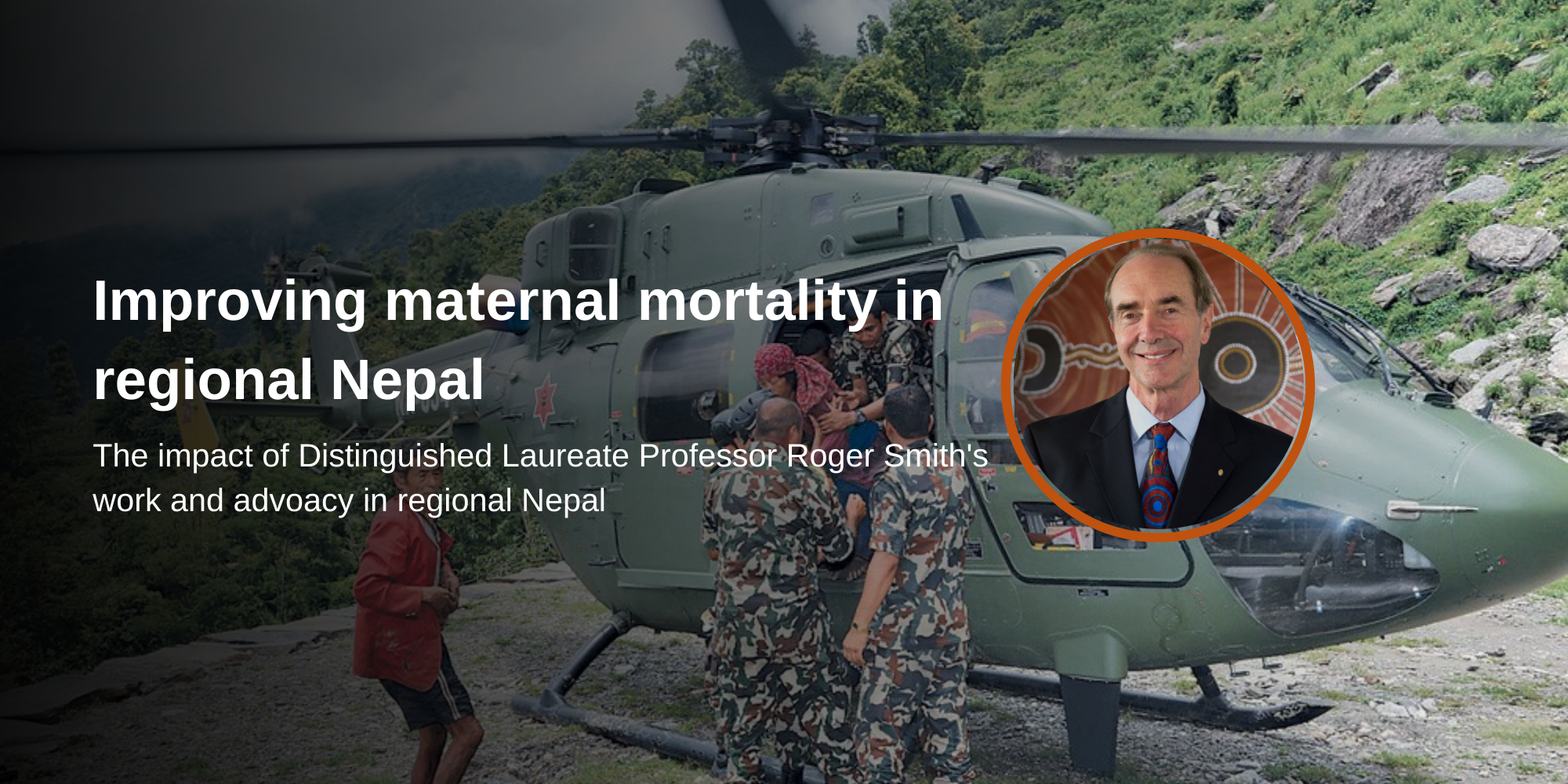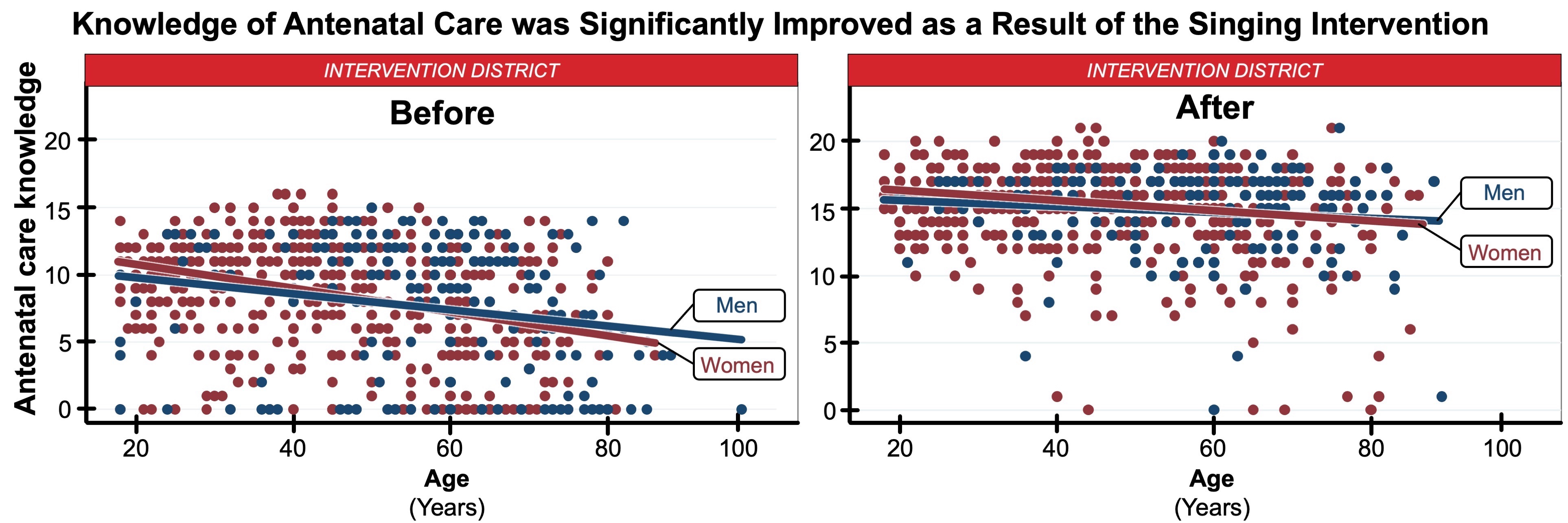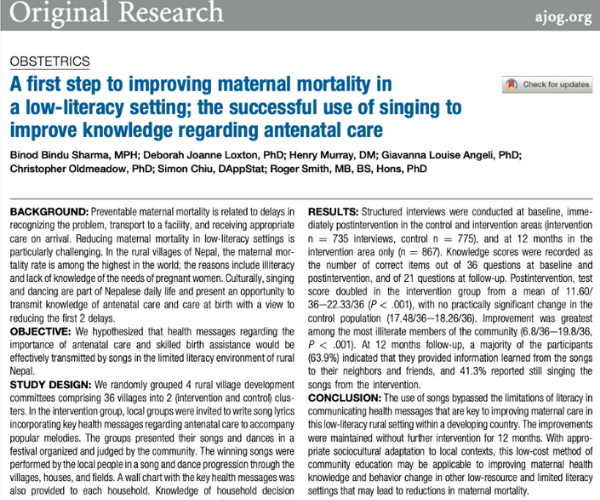
Key Highlights

A culturally sensitive introduction of a singing program within rural Nepal to raise the awareness of the importance of antenatal care
Partnering with the Nepalese army for the timely evacuation of 179 women to date who were experiencing obstetric emergencies in remote districts of Nepal
Negotiating successfully with the Nepalese Government for the distribution of sanitary napkins to Nepalese school girls
An interview with Dr Binod Bindu Sharma. Binod completed his PhD at The University of Newcastle and Hunter Medical Research Institute under the supervision of Distinguished Laureate Professor Roger Smith, where he developed strategies to reduce maternal mortality in his home country of Nepal.
After returning to Nepal, Binod now works as a Director, Ministry of Social Development, Province Government, Gandaki, Pokhara, Nepal, and talks about how he has put what he learnt in Australia into practice to save lives in Nepal.
In many low-income countries, such as Nepal and Indonesia, maternal deaths are not reliably recorded. The estimates of maternal mortality in Nepal are one in 338 pregnancies, while in Finland the rate is one in 33,333. As women in Nepal have more pregnancies, the lifetime risk of dying during pregnancy may be as high as one in 50. The low maternal death rate in Finland, Australia, and other developed countries indicates that the majority of maternal deaths are avoidable.
Maternal deaths occur because of three delays in the provision of effective care:
1. A delay in the family realising that a woman is in difficulty and taking action
2. A delay in transport to a health facility
3. A delay in the provision of care on arrival at the health facility
To reduce maternal mortality, the solution must address all three delays concurrently, as each delay alone is able to lead to the death of the woman.
Distinguished Laureate Professor Roger Smith has led work in the development of interventions to address these delays including the successful use of singing to improve knowledge regarding antenatal care, as well as working with the Nepalese Government to fund and introduce a helicopter retrieval program for women with obstetric emergencies.
Evidence of impact in addressing delay 1
Intervention 1: The successful use of singing to improve knowledge regarding antenatal care
In Nepal, singing is a popular folk medium.
To capitalise on this, Distinguished Laureate Professor Roger Smith led the creation of a singing program within rural Nepal to raise villagers awareness of the needs of pregnant women.
The songs addressed the first delay: decision-making at the village level.
The intervention, implemented by Dr Binod Bindu Sharma succeeded in significantly raising the awareness of villagers as to the importance of seeking antenatal care and were especially effective for raising the awareness of illiterate villagers. Moreover, awareness among the villagers remained significantly improved at follow-up 12-months later.

Graph: Knowledge of antenatal care
![1[1]-Mar-19-2021-01-46-59-41-AM 1[1]-Mar-19-2021-01-46-59-41-AM](https://6648029.fs1.hubspotusercontent-na1.net/hubfs/6648029/1%5B1%5D-Mar-19-2021-01-46-59-41-AM.png)
Photo: Students submitting songs they have written to the song competition
![7[1]-1 7[1]-1](https://6648029.fs1.hubspotusercontent-na1.net/hubfs/6648029/7%5B1%5D-1.png)
Photo: Song competition
![11[1] 11[1]](https://6648029.fs1.hubspotusercontent-na1.net/hub/6648029/hubfs/11%5B1%5D.png?width=1400&height=700&name=11%5B1%5D.png)
Photo: Villagers singing along with minstrels to songs about antenatal care
![10[1] 10[1]](https://6648029.fs1.hubspotusercontent-na1.net/hub/6648029/hubfs/10%5B1%5D.png?width=1000&height=500&name=10%5B1%5D.png)
Photo: Male village elders dancing to songs about the importance of antenatal care
![8[1]-Mar-19-2021-02-16-33-31-AM 8[1]-Mar-19-2021-02-16-33-31-AM](https://6648029.fs1.hubspotusercontent-na1.net/hubfs/6648029/8%5B1%5D-Mar-19-2021-02-16-33-31-AM.png)
Photo: Village minstrels singing songs about antenatal care
Video: Pathways to improving maternal mortality in rural Nepal

Journal Extract: American Journal of Obstetrics and Gynecology (2018)
Evidence of impact in addressing delays 2 & 3
Intervention 2: The successful use of helicopter retrievals for women with obstetric emergencies
To address the second and third delays, Distinguished Laureate Professor Roger Smith worked with the Nepalese Government to introduce a helicopter retrieval program for women with obstetric emergencies. The program, funded by the Nepalese government, has repurposed military helicopters for the retrievals and links villagers in remote and inaccessible regions to hospitals able to supply emergency care, such as blood transfusion and caesarean section.
As of March 2021, the program, which commenced December 2018, has successfully evacuated 179 women experiencing obstetric emergencies in remote districts and transferred them to hospitals. Within the Gandaki province, 36 air retrievals have translated into saving the lives of 35 mothers (97%) and 34 (94%) newborns. Of the 179 pregnant women retrieved, local health officials estimate that >60% would have died without helicopter retrieval, with death rate of the newborns being even greater.
This program is a highly visible commitment of the Nepalese Government to the wellbeing of pregnant women. The arrival of a helicopter to rescue a pregnant woman in a remote village has enormous symbolic significance to all the villagers, making a clear statement that the lives of women matter.
News articles
"Helicopter Rescues Pregnant Women in Jajarkot" - The Himalayan Times | 6 Sept 2019
"Helicopter Rescue the Only Chance of Survival for Pregnant Women in Remote Areas of Karnali" - Kathmandu Post | 24 Nov 2019
"Nepal Still Has a Long Way too Go to Lower Infant and Maternal Deaths" - Kathmandu Post | 2 Jan 2020
"Helicopter Rescue Programme for Pregnant women Effective in Gandaki Province" - Kathmandu Post | 11 Mar 2020
"Pregnant Women Airlifted to Kathmandu After Excessive Bleeding" - eAdarsha.com | 28 Mar 2020
"Birth and Death During a Pandemic" - Nepal Times | 17 June 2020
"Pregnant Women Rescued by Helicopter" - Nepal eKhabar.com | 18 Jul 2020
"Pregnant Mother Rescued by Army Helicopter" - Nepal Page | 22 Jul 2020
"Helicopter Rescue for Pregnant Women Effective - 16 Rescues in 8 Months" - Rising Nepal Daily | 31 Jan 2021
![16[1] 16[1]](https://6648029.fs1.hubspotusercontent-na1.net/hubfs/6648029/16%5B1%5D.png)
Photo: Pregnant woman arriving at hospital helicopter retrieval
![15[1] 15[1]](https://6648029.fs1.hubspotusercontent-na1.net/hubfs/6648029/15%5B1%5D.png)
![9[1] 9[1]](https://6648029.fs1.hubspotusercontent-na1.net/hubfs/6648029/9%5B1%5D.png)
Photo: Pregnant woman arriving at hospital helicopter retrieval
Photo: Lives saved after a young pregnant woman with obstructed labour was airlifted to hospital
![5[1]-Mar-19-2021-02-16-09-23-AM 5[1]-Mar-19-2021-02-16-09-23-AM](https://6648029.fs1.hubspotusercontent-na1.net/hubfs/6648029/5%5B1%5D-Mar-19-2021-02-16-09-23-AM.png)
![4[1]-Mar-19-2021-02-16-17-40-AM 4[1]-Mar-19-2021-02-16-17-40-AM](https://6648029.fs1.hubspotusercontent-na1.net/hubfs/6648029/4%5B1%5D-Mar-19-2021-02-16-17-40-AM.png)
Photo: Distinguished Laureate Professor Roger Smith meets with Hon. Minister for Women, Children and Senior Citizen, Mrs Tham Maya Tapa
Photo: Distinguished Laureate Professor Roger Smith and the team ABC News, Nepal
Video: Television special Gandaki Maternal Care Program
Gandaki Television
Video: ABC News Nepal - ABC Disclosure with Distinguished Laureate Professor Roger Smith, Annie Smith and Dr Binod Bindu Sharma
Intervention 3: Improving girls' access to education in Nepal through provision of sanitary pads
In Nepal, there are extensive taboos surrounding menstruation that severely impact on the ability of girls to gain secondary education. Chhaupadi is a form of menstrual taboo that prohibits Hindu women and girls from participating in normal family activities whilst menstruating, as they are considered "impure". During chhaupadi, women are banned from the house and are required to live in a cattle shed or a makeshift dwelling, known as a menstruation hut, for the duration of their period. This is a life-threatening practice, especially in a Himalayan winter. The community attitude to menstruation makes it exceedingly difficult for girls to continue to attend school after they begin menstruation. This curtails their educational achievements, reduces their employment and economic opportunities, increases the likelihood of marriage at a young age and pregnancy and child birth as teenagers.
To improve the access of Nepalese girls to secondary education, Distinguished Laureate Professor Roger Smith lobbied the Nepalese government to provide free sanitary napkins to all schoolgirls. In the 2019 Nepalese budget, $6.4M annually was allocated for the provision of napkins for every schoolgirl. The sanitary napkins are being made in Nepal using washable cotton material with a Gortex inner layer to provide a barrier against leakage.

Photo: Washable cotton sanitary napkins that are made by local Nepalese women with disabilities
![2[1]-Mar-19-2021-01-55-10-90-AM 2[1]-Mar-19-2021-01-55-10-90-AM](https://6648029.fs1.hubspotusercontent-na1.net/hubfs/6648029/2%5B1%5D-Mar-19-2021-01-55-10-90-AM.png)
Photo: Distinguished Laureate Professor Roger Smith visiting local women with disabilities who produce washable sanitary napkins
![3[1]-Mar-19-2021-01-55-20-05-AM 3[1]-Mar-19-2021-01-55-20-05-AM](https://6648029.fs1.hubspotusercontent-na1.net/hubfs/6648029/3%5B1%5D-Mar-19-2021-01-55-20-05-AM.png)
Photo: Distinguished Laureate Professor Roger Smith meeting with local female entrepreneurs
![6[1]-Mar-19-2021-02-16-03-29-AM 6[1]-Mar-19-2021-02-16-03-29-AM](https://6648029.fs1.hubspotusercontent-na1.net/hubfs/6648029/6%5B1%5D-Mar-19-2021-02-16-03-29-AM.png)
Photo: Distinguished Laureate Professor Roger Smith meeting with the Social Development Ministry